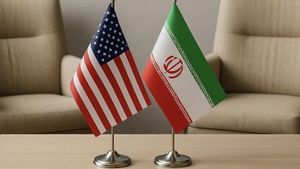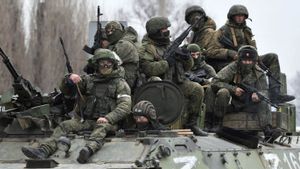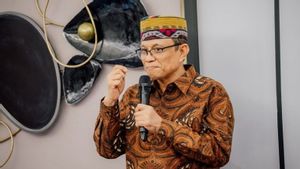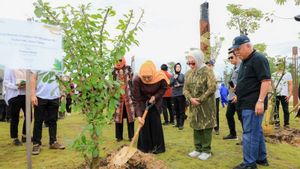JAKARTA - Apart from paramedics, in fighting COVID-19, one of the units most at risk of contracting the virus is military forces. The countries in the European Union are starting to become aware of this danger.
Now military activity throughout mainland Europe has begun to be reduced. They also impose stricter regulations on military personnel, as a form of COVID-19 prevention.
Military groups indeed often guard the COVID-19 red zone and do not conduct social distancing between their personnel so they are very susceptible to infection with the virus.
It is important to prevent the spread of the virus among the military. This is because military groups play a role in national security. Additionally, special army, navy and air force units are being designed to help governments tackle the virus in many already overwhelmed countries.
An example of the military's role in fighting COVID-19 is the military in Poland. The country launched thousands of troops to patrol the streets during the lockdown, disinfect hospitals and support border control.
Launching Reuters, Tuesday, April 7, Germany deployed 15,000 troops to help local authorities overcome the crisis. Germany has changed the rules, with no troop deployments and some personnel quarantining.
Meanwhile, the Turkish armed forces have implemented social distancing in the rooms and dormitories of military personnel. Turkey has also restricted troop movements in Syria as COVID-19 cases soar.
The events aboard the US aircraft carrier Theodore Roosevelt have highlighted the risk of the disease spreading rapidly among military personnel. The 5,000-crew nuclear-powered ship is now docked in US territory, Guam, so everyone is testing.
The captain of the US Navy decided to create rules to allow space for personnel on board. His order came after he wrote a letter concerned about the lack of appropriate measures to tackle this highly contagious disease.
Acting US Navy Secretary Thomas Modly said Captain Brett Crozier exercised poor judgment in writing the letter about coronavirus outbreak on USS Theodore Roosevelt and has been removed from command https://t.co/chh7OXnhtu pic.twitter.com/HXN4uMi5Py
- Reuters (@Reuters) April 2, 2020
The European Union countries most affected by COVID-19, namely Italy, Spain and France, have had the number of military operations reduced or some even suspended.
"We must cancel non-essential maritime missions and deployments, or modify their scope," said French military command spokesman Colonel Frederic Barbry.
French naval vessels in the Strait of Hormuz have stopped stopping at regional ports other than Abu Dhabi and air force exercises have also been canceled. In France, 600 military personnel have contracted COVID-19, said the French Minister of Defense. Meanwhile, four soldiers serving the Barkhane operation to fight extremist groups in West Africa are also infected with COVID-19.
The Italian Ministry of Defense provided information about the officers, saying Chief of Staff Salvatore Farina and 12 other officers had tested positive for COVID-19. One lieutenant-colonel has died from the virus.
The Spanish Ministry of Defense said that as many as 230 military personnel had tested positive for COVID-19. Meanwhile, about 3,000 military staff carried out self-isolation. Spain itself is the second country in the world to be hit hard by COVID-19 after the United States.
Citizens protest against military presence in # Spain's # Pamplona # COVID19 pic.twitter.com/W944uDdt7a
- RT (@RT_com) April 4, 2020
A spokesman for the German defense ministry said about 250 soldiers had contracted COVID-19, with less than 10 being hospitalized. German troops going to Afghanistan are required to undergo 14 days of isolation in advance, while four Italian soldiers deployed to Kabul tested positive when they arrived.
The military units are already helping mightily with the logistics and distribution of medical equipment across the country. Unfortunately, however, it is unclear how many soldiers will have to test.
Testing military personnel is essential to prevent transmission of the virus to other members. You can imagine if military personnel in the European Union collapsed due to COVID-19, the governments of countries in Europe will experience a lack of human resource assistance so that the fight against COVID-19 will be even more difficult.
"There will be an impact from this crisis, not only on the resources available for defense and security but in how those resources are distributed," said Malcolm Chalmers, deputy director of the Royal United Services Institute.
The English, Chinese, Japanese, Arabic, and French versions are automatically generated by the AI. So there may still be inaccuracies in translating, please always see Indonesian as our main language. (system supported by DigitalSiber.id)













